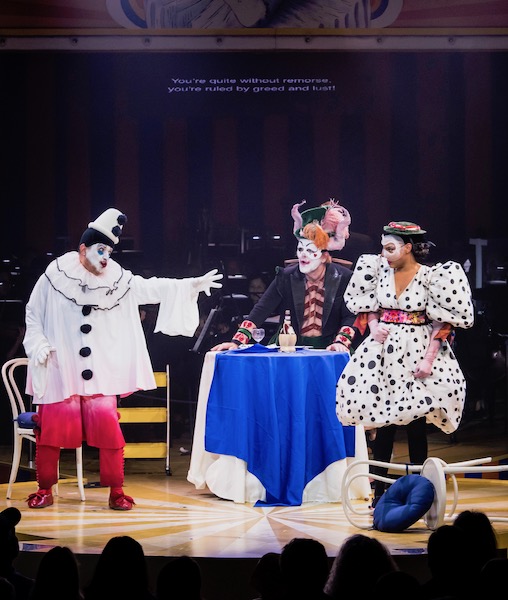BLO’s Big Top “Pagliacci” offers more visual flash than dramatic bite

The prologue to Ruggero Leoncavallo’s Pagliacci invites listeners into a world where characters on the fringe of society find themselves in terrible predicaments. The story, crafted by the composer from true events, tells of a secret affair between an actress and her lover that eventually plays out as a cautionary tale of jealously, revenge, and murder. Spectacle and drama, the opera suggests, are to be found in all walks of life.
Unfortunately, in Boston Lyric Opera’s new production of this popular favorite, which opened Friday night at the DCR Steriti Memorial Rink, dramatic intrigue seemed to be in short supply. Sung in a hapless English translation that failed to convey the powerful emotions of the opera, this Pagliacci proved more show than substance.
The production began even before the opera took the stage. Audience members were treated to a carnival set up outside the main hall, where clowns, jugglers, and acrobats complemented the various games of ring and coin toss. That atmosphere carried over to the opera itself, which unfolded under a big tent complete with colorful lights and a circus-like set, designed by Julia Noulin-Mérat. David Lefkowich’s stage directions kept the action moving swiftly, and simple props of chairs, table, and silverware were just enough to set the stage for the Intermezzo—the play-within-a-play of the opera’s second half.
As in previous years, the BLO has ventured into non-traditional venues for their productions, and the Steriti Rink proved an excellent choice for the visual aspects of this season opener. The stage and proscenium decorations, bathed in yellows and reds, transformed the space into the inside of a circus tent. Singers moved freely about onstage and into the aisles, which made for an intimate telling of the opera’s troubling story.
The acoustic, however, was far from ideal. Performing without amplification, the singers’ voices often failed to resonate with requisite vitality. Cramming the orchestra into the small space onstage didn’t help matters either as the accompanying music was often muffled. The BLO had a similar problem with last season’s production of Bernstein’s Trouble in Tahiti, which was also staged at the rink. Though the space may result in a fine spectacle, the musical performance, especially of an opera as melodically rich as Pagliacci, requires a more vibrant acoustic.
Likewise, performing the opera in English may have seemed inspired on paper. But Bill Bankes-Jones’s maladroit text, which he supplied for the Scottish Opera’s own production of Pagliacci last season, failed to deliver any sense of the character’s feelings of rage or jealousy. Direct, sometimes witty, but too often crass, the words ultimately felt ill suited to Leoncavallo’s soaring music. When a long vocal line accompanied Canio calling his wife Nedda a whore, one felt as if they were watching a caricature of the opera more than the actual thing.
The choice to keep the love duet between Nedda and her lover Silvio in Italian was therefore odd. Heard in its restored version Friday night (much of which is often cut), the aria fares best in its original language. But it only served as a reminder that the rest of the opera would have benefitted from being sung with a text that aptly expresses the emotional tension.
The mostly superb singing, however, largely overcame the production’s flaws.
Tenor Rafael Rojas took some time to find the heft and power needed for the role of Canio. Suffering from a throat infection, Rojas sounded a little light at the opera’s opening. But as the drama progressed, his singing grew in intensity, culminating in a radiant “Vesti la giubba,” which he sung in English. His acting captured all sides of the jealous husband, generous on the surface but quick to anger when he learns his beloved Nedda has betrayed him.
Lauren Michelle made Nedda into a warm and almost innocent figure. A soprano who is capable of ringing high notes, Michelle portrayed her character with all the tenderness of a girl next door. In “Stridono lassù,” the singer delivered her lines with intimacy and serenity, and her duet with Silvio was an expression of sincere love as her melodies flowered from almost whisper-like attacks. As Silvio, baritone Tobias Greenhalgh sang with a clarion voice that reflected all the character’s deeply felt affection for Nedda.
Baritone Michael Mayes made a conniving Tonio, the circus performer who longs to possess Nedda for himself. With a rich tone that easily cut through the orchestral accompaniment, Mayes conveyed the character’s fall into jealousy and vengeance. As Taddeo in the Intermezzo, Mayes found a sudden humor, stuttering his lines on purpose to aptly wry effect.
Omar Najmi sang with a full, crisp baritone in his brief role as Beppe. As Arlecchino in the Intermezzo, he delivered a pure-toned “O, Colombina” while humorously plucking out sour notes on a guitar.
The chorus and Boston Symphony Children’s Choir, prepared by Brett Hodgdon, sang with assurance to make for vivid crowd scenes. Spread throughout the audience, the singers still managed to render their lines with clarity and plush ensemble blend.
Leoncavallo sets his story with sweeping melodies and lustrous orchestration, and conductor David Angus, leading with swift, waving gestures, allowed the music to breathe naturally in all the right places. The string lines that supported the arias and duets flowed gracefully. Trumpets provided sturdy fanfares to open the Intermezzo, and the overture and introduction to the opera’s second half coursed with vitality, making fine accompaniment for the rope-climbing acrobats performing offstage during those moments.
Pagliacci runs through October 6 at the DCR Steriti Memorial Rink. blo.org
Posted in Performances




